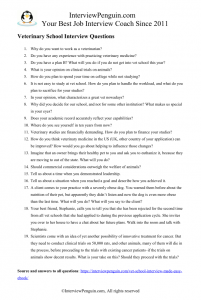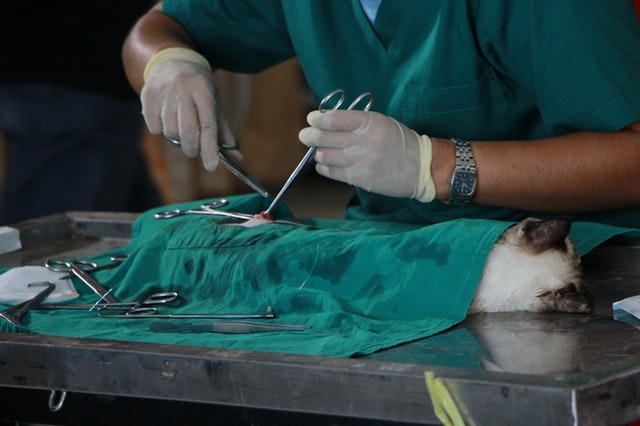Veterinary medicine is a broad field which encompasses much more than just treating and preventing diseases in animals. Food and safety inspection falls within the field, so does veterinarian research (including test trials on animals), and other things.
Needless to say, a lot of ethical issues are popping up lately, with the animal rights movements, growth of veganism (including militant veganism), and the latest discoveries of unethical practices that rule the majority of mass production of meat and diary products in the developed countries, and the impact it has on our health as final consumers.
All these things reflect also in Vet School interviews. Long gone are times when you faced just a few simple questions such as “Tell us about yourself” or “Why did you choose our school and not another one?”
Surely, you may still get these questions, but you will get also other questions, more difficult, and some Vet Schools started to interview the applicants with the MMI format. In this article we will look at some questions you may face in both conventional panel interviews and MMI. Let’s start!
Table of Contents
Why do you want to work as a veterinarian?
You should not say only that you love animals. That goes without saying. But you can become a vegan if you really love animals, and all kids also love animals, so it doesn’t make for a strong enough reason to apply for a difficult four year study program, one which will have an impact on your entire professional career and life.
Try to come up with something more specific. Perhaps a specialty field of veterinary medicine that caught your eye, and you’d love to practice it one day. Or your parents happen to run a small farm, and your goal is to become the lead veterinarian there. Or you have your own business plan, a certain clinic or practice you’d like to start in the future, in the location of your choice.
Or, perhaps, you understand that we are what we eat, and you’d love to dive into veterinarian research, perhaps trying to find out the real impact meat consumption has on our well-being, or you even want to lead some clinical trials on animals, while trying to find the cure to some disease that bothers humanity.
Remember, the more specific you are in your answer, the better for the interviewers. Because vet school is not easy, and your motivation can quickly fade away if you apply just because you “love animals”, without any future goal on your mind.
Do you have any experience with practicing veterinary medicine?
It is a huge plus if you have any experience working with veterinarians or veterinary researches, especially if you have any hands-on experience with animals.
Now, if you do have experience, you should narrate in detail what exactly you did, at which place, who was your lead veterinarian, and also how this experience impacted your decision to pursue a career in veterinary medicine–in an ideal case, it should enforce your desire to study at vet school, but also help you understand some tough aspects of the job (such as treating aggressive animals, being called to work at night, facing ethical dilemmas, etc).
If you have no experience, you should be able to explain why. Maybe it was a last minute decision for you to apply at a vet school, after some event that changed your point of view, or some documentaries you have seen. And since you decided just recently, you had other jobs before. But you definitely plan to gain some experience during your studies, because you know it is important.
Try to talk with enthusiasm while describing your experience in the interview. They should get an impression that you enjoy the work, that you see a meaningful purpose in it.
Do you have a plan B? What will you do if you do not get into vet school this year?
The key is to convince them that you are serious about your application and career plans. That means, if you do not get in this year, you will try your luck during the next application cycle. But you won’t spend the year doing nothing, just hanging around, drinking, ans wiping the screen of your smart phone. You will try to get as much hands-on practice with animals as possible, and also prepare better for the next application cycle.
You can suggest also different plans, as long as they make sense. For example you may go and volunteer on an ecological farm abroad, learning a new language and experiencing first hand how things work in veterinary medicine in a different country and culture.
Another alternative is saying that you believe you’ve done the most to succeed, and will succeed. You do not consider failure an option, and will think about your next steps once the application cycle is over. Now, at this moment, you focus all your energy and thoughts on the interviews only. Why think about possible negative outcome anyway? You believe you’ll get to vet school, and if you don’t, you’ll cross the bridge when you come to it.
What is your opinion on clinical trials on animals?
More often than not, you will get at least a few question that touch some ethical dilemmas. It can be clinical trials, mass production of meat and diary (and the terrible conditions animals have to endure in such facilities, from birth to death), or it can be the mandatory neuter/spay laws.
My suggestion: Tell them what you really think, but talk in opinions. Let me explain… They are definitely looking for students with personality, for people who can think critically, who have their opinion. Hence you should have an opinion about these ethical issues.
At the same time, however, you should present it as such–an opinion, not some definite truth everyone has to follow. Let me give you an example of two answers that convey the same message, but in a very different way:
I condemn all clinical trials on animals. We must forbid them for good. People who lead these trials, or participate on them, should meet the same fate like the animals in their trials.
In my opinion, it is not the best solution, to do clinical trials on animals. We should try to find better ways of testing new drugs and treatments of various diseases, to minimize the suffering of animals in the world.
As you can probably guess, answer no. 2 is a much better choice…
Special Tip: To know how to answer the question, and to come up with an amazing answer on a big day, when facing a panel of interviewers, are two different things. If you experience anxiety, or aren’t sure how to deal with the questions, have a look at a new eBook I wrote for you, the Vet School Interview Made Easy. Multiple brilliant answers to 30 most common vet school interview questions (including the tricky scenario-based questions you may face in your MMI) will help you streamline your preparation, and ace your interview. Thank you for checking it out!
How do you plan to spend your time on college while not studying?
You have two options for a good answer to this one. First one is saying that you want to commit almost all your time to studies. Books, books, and ever more books, that’s your plan. You aspire to be one of the very best students in the class, and, together with some hands-on experience, you can’t imagine doing much more than studying and volunteering at some clinic or farm.
Of course, you won’t be a total outsider, never joining your schoolmates for a round of beers (or glasses of orange juice). But your studies and perhaps a part time or volunteering opportunity, which you may get with some clinic, are your first priority, and you’ll treat everything else as secondary.
Another option is referring to activities for the campus community. Perhaps you want to become a resident assistant, or represent your fellow students in a student council, or volunteer in a library, or organize some events at school, or do something else to give back to the community.
At the end of the day, selfless students who try to give something back to their alma mater, or their fellow students, are always highly regarded by the teachers and other admission committee members.
Some other questions you may face in your vet school interviews (both conventional and MMI format)
- It is not easy to study at vet school. How do you plan to handle the workload, and what do you plan to sacrifice for your studies?
- In your opinion, what characterizes a great vet nowadays?
- Why did you decide for our school, and not for some other institution? What makes us special in your eyes?
- Does your academic record accurately reflect your capabilities?
- Where do you see yourself in ten years from now?
- Veterinary studies are financially demanding. How do you plan to finance your studies?
- How do you think veterinary medicine in the US (UK, other country of your application) can be improved? How would you go about helping to influence those changes?
- Imagine that an owner brings their healthy pet to you and ask you to euthanize it, because they are moving to out of the state. What will you do?
- Should commercial considerations outweigh the welfare of animals?
- Tell us about a time when you demonstrated leadership.
- Tell us about a situation when you reached a goal and describe how you achieved it.
- A client comes to your practice with a severely obese dog. You warned them before about the nutrition of their pet, but apparently they didn’t listen and now the dog is even more obese than the last time. What will you do? What will you say to the client?
- Your best friend, Stephanie, calls you to tell you that she has been rejected for the second time from all vet schools that she had applied to during the previous application cycle. She invites you over to her house to have a chat about her future plans. Walk into the room and talk with Stephanie.
- Scientists come with an idea of yet another possibility of innovative treatment for cancer. But they need to conduct clinical trials on 50,000 rats, and other animals, many of them will die in the process, before proceeding to the trials with existing cancer patients–if the trials on animals show satisfactory results. What is your take on this idea? Should they proceed with the trials?
- …..
Special Tip: If you want to do more than your competitors, and know something they won’t know while trying to make an impression on the admission committee in the vet school interviews, have a look at a new eBook I wrote, the Vet School Interview Made Easy. Multiple brilliant answers to all these questions (+ more) will help you stand out, and secure the coveted spot in the study program. Check some great sample answers directly on the eBook page…
A little word to MMI interviews at vet school
In my opinion, the biggest difference between traditional and MMI interviews is that you cannot make a connection with the interviewer during the MMI. I mean, typical panel interviews always allow some room for small talk, and also give you an opportunity to correct your mistake–several times.
For example, if you struggle with a question and remain silent, or maybe do not answer it in a most appropriate way, you get a change to remedy your mistake, with your next answers. What’s more, interviewers are only people. If you make a good connection with them, they may forgive you more than one bad answer.
Nothing of this is possible in MMI. There’s no time for small talk and making connection, no room for remedying your error. You have just one chance, one question, and that’s it!
So definitely this is tougher, but perhaps also more fair to people who do not have a charisma, or aren’t that strong in selling their skills in the interview. And that’s the goal after all, to make an unbiased decision, to choose the best applicants (and not the one we like the most). Keep in on your mind if you are preparing for the MMI…
Conclusion, next steps, answers to all questions
All around the world, the average acceptance rate to vet school is just about 20% (it can be higher at some universities, but also lower). You may not get many chances to interview for a place at a vet school. When you get such a chance, you should do all you can to succeed.
Research a lot about the school. Check the entire curricula and pick some courses that you really like. Prepare a short answer to each question from our list, and check also other sources online and offline. If you can, practice your answers with a friend or with an interview coach.
It’s not easy to get into the vet school, but someone (typically 15%-25% of applicants) will always make the cut. Why couldn’t it be you? Prepare for your interview, and try to stand our with logical and genuine answers. And if you are not sure how to do that, you can always seek help in the eBook I wrote for you, the Vet School Interview Made Easy.
Thank you for reading, and I wish you best of luck!
Matthew Chulaw, Your personal interview coach
* Alternatively you can download the list of questions in a one page long PDF, print it, and practice your interview answers anytime later, for example with a friend:

May also interest you:
- Dental school interview questions.
- Osteopathic Medical School interview questions.
- Nursing school interview questions.


